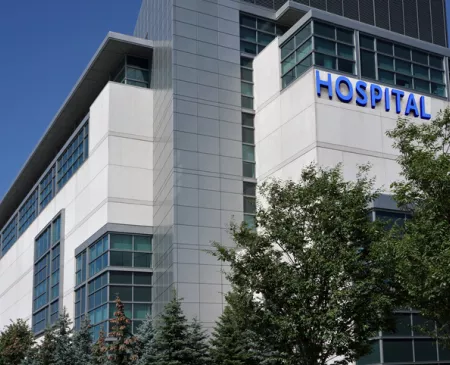About
St. Elizabeth Healthcare is one of the largest health systems in the Cincinnati and northern Kentucky region. It is also at ground zero for cancer care in the country, with the worst rates of lung cancer and colon cancer, among others. St. Elizabeth recently opened a cutting-edge cancer center to address community needs. Chartis Oncology Solutions Director Ryan Langdale spoke with Dr. Doug Flora, Executive Medical Director, about the new facility.
I wanted to be a physician since I was 5 years old. I enjoyed science and knew I wanted to pursue this career path. My mom passed away from breast cancer in her early 40s. I’m a cancer doctor and so is my brother, and I like to think our personal experience led us to helping others in this area. I was diagnosed with kidney cancer, and I’m also now a cancer survivor. When you have a chance to save a life and cure someone, it’s really powerful.

Dr. Doug Flora,
Executive Medical Director,
St. Elizabeth Cancer Center
Background
Ryan Langdale:
Patients need intelligent healthcare more than ever before. That’s what St. Elizabeth’s is now delivering in the northern Kentucky and Greater Cincinnati area with its new cancer center. What makes this new center special compared to others around the country?
Dr. Flora:
We are dedicated to what we call whole-patient care. The board, senior leaders and community bought into this concept from the beginning. We provide the full spectrum of care, from initial diagnosis all the way through bereavement or survivorship, in one setting.
"We are shifting the paradigm to find cancer in its earliest and faintest footsteps."
Keys to Success
Ryan Langdale:
It was an interesting time to open this center in the midst of COVID. We know people are putting off important care. What is St. Elizabeth’s doing to make sure patients get the right cancer care in the right place when they need it?
Dr. Flora:
I think the primary thing for me is to be out front and get the message out that we are safe, clean, and open. We have seen screening levels drop at historic levels. We will start to lose people 5 or 10 years from now due to these drops.
We are focused on screening, prevention, and diagnosis. We are trying to shift the paradigm to find cancer in its earliest and faintest footsteps. We have a Center for Precision Health Medicine and Genomic Health and a large lung cancer screening program. All of this is in an effort to find patients when they are still “fixable.”
Lessons Learned
Ryan Langdale:
Creating a cancer center is a time-consuming process. What was key to making it a success?
Dr. Flora:
Our engagement with Chartis was important to our success, including the deep dive Chartis did on our new building, helping our team design the structure by which we would impact change through strategic planning.
Ryan Langdale:
What surprised you the most in building the cancer center?
Dr. Flora:
We learned the most when we listened to our patients. The things they valued were not necessarily the things I would have identified as a cancer doctor. The patient family advisory group was focused on things like, “How do I tell my kids I have cancer?” This is obviously gut wrenching and important. We would have missed this if we hadn’t spoken to the right people. I’m hoping to expand this further — we want to have a steering committee, for example, of patient volunteer leaders who engage with a wider audience of patients.
"We are dedicated to what we call whole-patient care, from initial diagnosis all the way through bereavement or survivorship, in one setting."
What's Next
Ryan Langdale:
In 5 or 10 years, looking ahead, how do you see the new cancer center impacting the community?
Dr. Flora:
We want to improve health literacy for our community. I think the difference between 2005 and 2020 is that we need to get out of our own building. We need to teach the community that obesity, tobacco, and alcohol abuse are modifiable behaviors that cause cancer. We need to teach the importance of screening — especially to male patients, persons of color, and persons who are socio-economically disadvantaged. That’s what we are working toward.







